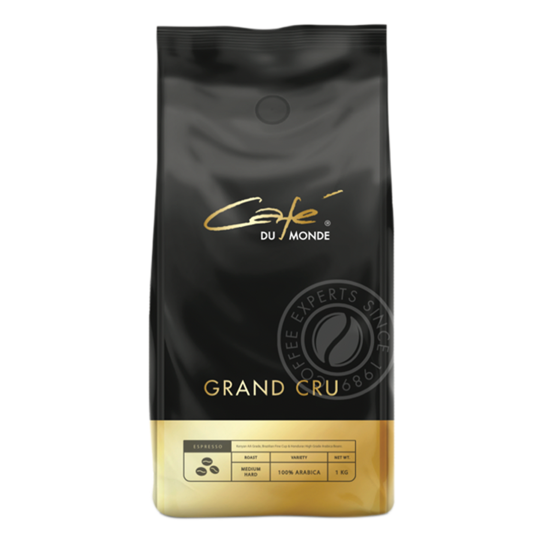
Grand Cru Espresso Beans
This is our 100% Arabica espresso coffee blend. It has the best Kenyan AA Grade beans for acidity, citrus notes and a chocolate after taste.
£25.65
View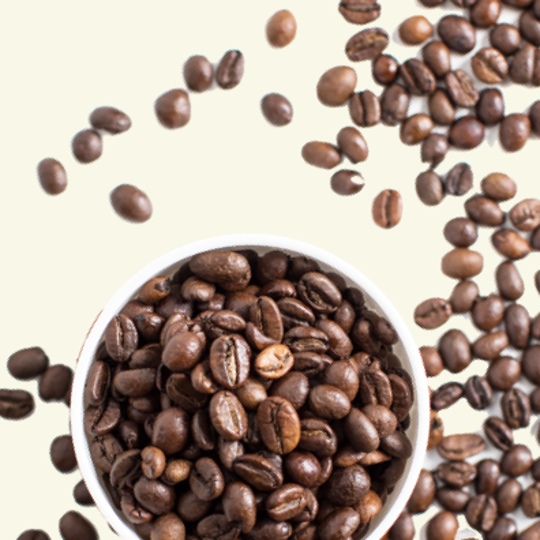
Excelsa coffee is a distinctive variety within the coffee family.
View Our Espresso BeansOften overshadowed by the more well-known Arabica and Robusta beans, Excelsa deserves its own spotlight for the unique contributions it makes to the coffee world.
Excelsa coffee, scientifically known as Coffea excelsa (recently reclassified as a variety of Coffea liberica), is primarily grown in Southeast Asia, particularly in Vietnam and the Philippines. Discovered in 1903 in Africa, it was initially categorised as a separate species due to its distinct characteristics but has since been reclassified. The cultivation of Excelsa is relatively limited, making it a rare and often sought-after variety among coffee connoisseurs.
Excelsa coffee, scientifically known as Coffea excelsa and recently reclassified as a variety of Coffea liberica, was discovered in 1903 in Africa, specifically around Lake Chad. Despite its African origins, it has found its true home in Southeast Asia, where it has become an integral part of the coffee culture in several countries. The bean’s reclassification is a testament to its unique characteristics, which distinguish it from other coffee varieties.
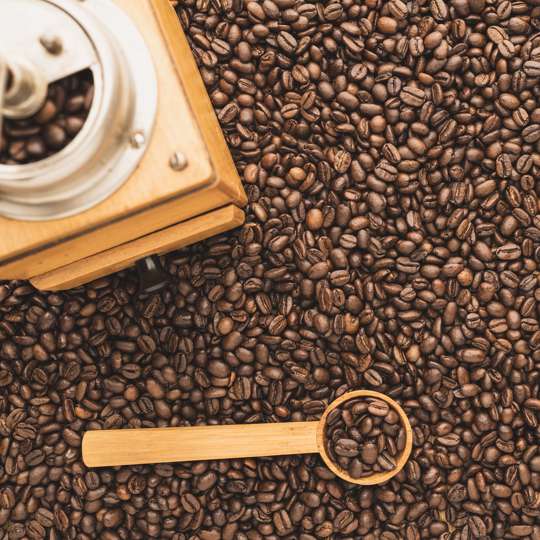
Southeast Asia:
Vietnam: Vietnam is one of the primary producers of Excelsa coffee. The country's diverse climate and rich soil provide ideal conditions for cultivating this unique bean. Vietnamese farmers have embraced Excelsa for its robust growth and resilience to local pests and diseases.
Philippines: The Philippines is another significant cultivator of Excelsa coffee. Here, the bean is often grown in small, family-owned farms, contributing to the local economy and preserving traditional farming practices. The Philippines' tropical climate and varied terrain offer perfect growing conditions for Excelsa.
While Southeast Asia remains the heartland of Excelsa cultivation, smaller quantities are also grown in parts of Africa and South America. These regions contribute to the global supply of Excelsa, though to a lesser extent than Vietnam and the Philippines.
Growing conditions:
Climate: Excelsa coffee thrives in tropical climates with high humidity and ample rainfall. It can grow at lower altitudes, unlike Arabica, which requires high elevations. This adaptability makes it suitable for regions where other coffee varieties might struggle.
Soil: The bean prefers rich, well-drained soil, often found in volcanic regions. This soil composition contributes to the unique flavour profile of Excelsa coffee, imparting a distinct richness and complexity.
Harvesting methods:
Traditional practices: In countries like the Philippines, Excelsa coffee is often harvested by hand. Farmers carefully select ripe cherries to ensure optimal quality. This labour intensive process helps preserve the integrity of the beans and supports sustainable farming practices.
Processing: After harvesting, the beans undergo various processing methods, including natural, washed, and honey processing. Each method impacts the final flavour profile, allowing producers to experiment and highlight different aspects of the beans' characteristics.
Resilience:
Excelsa coffee plants are known for their resilience to diseases and pests, making them easier to cultivate compared to the more delicate Arabica plants. This hardiness is a significant advantage for farmers, reducing the need for chemical interventions and promoting more organic farming practices.
Excelsa coffee is renowned for its complex and balanced flavour profile, which sets it apart from other coffee varieties. The complexity of Excelsa coffee lies in its ability to deliver a multifaceted taste experience that evolves with each sip. It is characterised by a combination of fruity, tart, and sometimes spicy undertones, making it a fascinating choice for coffee enthusiasts looking to explore diverse and unique flavours.

Fruity undertones: Excelsa coffee is often noted for its vibrant fruity flavours. These can range from tart, berry-like notes to more mellow, stone fruit characteristics. The fruity undertones give the coffee a lively and refreshing quality, often described as reminiscent of ripe cherries, plums, or dark berries.
Spicy undertones: Alongside its fruity notes, Excelsa coffee frequently exhibits spicy undertones. These can include hints of cinnamon, clove, or even a mild peppery spice, adding a warm, intriguing layer to the overall flavour profile.
Acidity and body: Excelsa coffee is known for its bright acidity, which contributes to its tartness and enhances fruitiness. This acidity is well-balanced by a medium to full body, providing a satisfying mouthfeel and a lingering finish. The balance between acidity and body ensures that Excelsa coffee is both lively and substantial.
Arabica:
Flavour profile: Arabica coffee is typically smooth and sweet, with a wide range of flavour notes including floral, fruity, nutty, and chocolaty undertones. It is known for its higher acidity and complex aroma.
Comparison: While Arabica also has fruity notes, Excelsa's fruitiness is more pronounced and tart. Arabica’s flavours are generally more delicate and nuanced, whereas Excelsa offers a bolder, more robust taste with a distinctive acidity and spiciness that Arabica lacks.
Robusta:
Flavour profile: Robusta coffee is known for its strong, earthy, and bitter flavour, often with notes of chocolate and nuts. It has a higher caffeine content, which contributes to its more intense and sometimes harsh taste.
Comparison: Excelsa's flavour profile is significantly more complex and less bitter than Robusta's. The fruity and spicy notes of Excelsa provide a stark contrast to the earthy bitterness of Robusta. Additionally, Excelsa has a brighter acidity and a more refined body compared to the heavy and straightforward robustness of Robusta.
Liberica:
Flavour profile: Liberica coffee has a unique, smoky, and woody flavour, often with floral and fruity undertones. It is less common and has a distinctive, sometimes polarising taste.
Comparison: Since Excelsa is a variety of Liberica, it shares some similarities, such as fruitiness and complexity. However, Excelsa tends to have a brighter and more pronounced acidity and a wider range of fruity and spicy notes, making it a more vibrant and dynamic option compared to the often heavier and smokier Liberica.
Excelsa coffee stands out with its rich and layered flavour profile, marked by vibrant fruity and spicy undertones. Its bright acidity and balanced body create a unique and enjoyable coffee experience. Compared to the smooth and sweet Arabica, the strong and bitter Robusta, and the smoky Liberica, Excelsa offers a distinct and complex alternative that is both refreshing and robust. This makes it an excellent choice for those seeking to diversify their coffee palate and explore new taste dimensions.
To fully appreciate the complex and unique flavours of Excelsa coffee, it's important to use brewing methods that highlight its fruity, tart, and spicy notes. Below we’ve included some recommended brewing techniques and tips to achieve the best results for your cup of coffee.
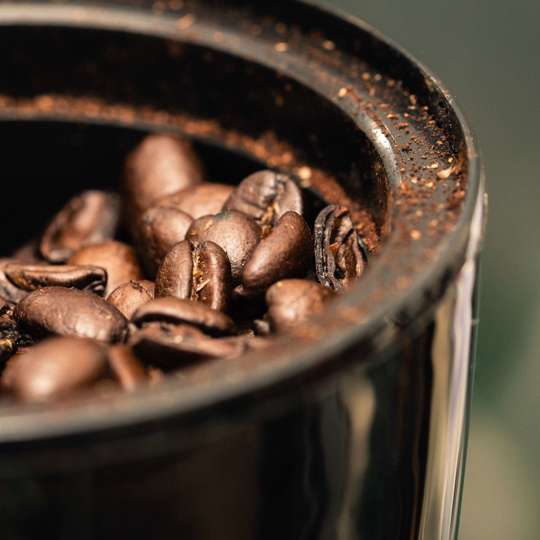
Pour-over:
The pour-over method is excellent for bringing out the nuanced flavours of Excelsa coffee. It allows for precise control over the brewing process, making it ideal for highlighting the coffee's bright acidity and fruity undertones.
Tips: Use a medium-fine grind size for optimal extraction. Pour hot water (about 200°F or 93°C) in a slow, circular motion, ensuring even saturation of the grounds. Aim for a total brewing time of about 3-4 minutes.
French Press:
The French press method enhances the body and mouthfeel of Excelsa coffee, emphasising its fuller body and bold flavours. This method also allows the natural oils to remain in the brew, adding to the complexity.
Tips: Use a coarse grind size to prevent over-extraction. Add water heated to around 200°F (93°C) and steep for about 4 minutes before pressing the plunger slowly. This method will produce a rich and full-bodied cup.
Espresso:
Brewing Excelsa coffee as espresso can highlight its intense and concentrated flavours, particularly its spicy and tart notes. This method brings out a strong and robust flavour profile.
Tips: Use a fine grind size suitable for espresso machines. Aim for a water temperature between 195°F and 205°F (90°C to 96°C) and an extraction time of about 25-30 seconds. Adjusting the grind size and extraction time can help fine-tune the balance of flavours.
Optimal Brewing Parameters
Grind size:
Pour-over: Medium-fine
French Press: Coarse
Espresso: Fine
Water Temperature:
Aim for a temperature between 195°F and 205°F (90°C to 96°C). This range is ideal for extracting the complex flavours of Excelsa coffee without causing bitterness or under-extraction.
Brewing time:
Pour-Over: 3-4 minutes
French Press: 4 minutes
Espresso: 25-30 seconds
Additional tips
Freshness: Use freshly roasted and freshly ground Excelsa coffee beans to ensure the most vibrant flavours.
Water quality: Use filtered water to avoid any off-flavours that can be imparted by tap water.
Experimentation: Since Excelsa coffee has a complex flavour profile, don't hesitate to experiment with different grind sizes, water temperatures, and brewing times to find the perfect balance for your taste preferences.
Brewing Excelsa coffee to enhance its unique flavours requires careful attention to the brewing method and parameters. Whether you prefer the precision of a pour-over, the richness of a French press, or the intensity of an espresso, each method can bring out different aspects of Excelsa's complex flavour profile. By experimenting with grind size, water temperature, and brewing time, you can tailor your brewing process to achieve the perfect cup of Excelsa coffee, showcasing its vibrant fruity, tart, and spicy notes.
Excelsa coffee's complex flavour profile is characterised by vibrant fruity notes, tart acidity, and subtle spiciness, which makes it an excellent candidate for a variety of culinary pairings. Below, we’ve included a little breakdown of the best treats to pair with your freshly brewed cup of coffee.
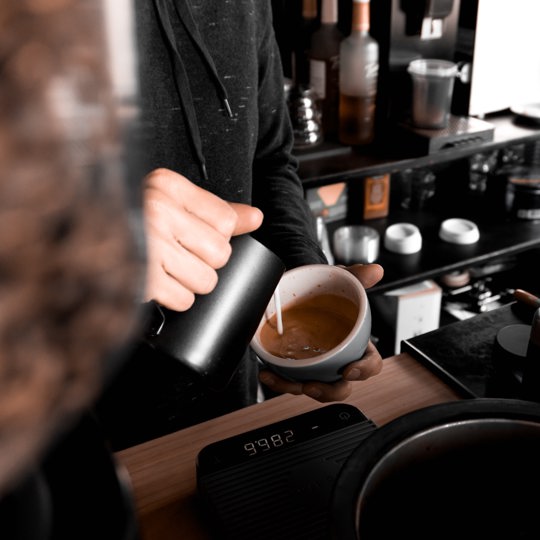
Fruit tarts: The fruity notes in Excelsa coffee pair wonderfully with fruit tarts, especially those featuring berries or stone fruits. The sweetness of the tart complements the coffee's acidity.
Cinnamon rolls: The spiciness of cinnamon rolls can mirror and enhance the spicy undertones in Excelsa coffee, creating a harmonious and comforting pairing perfect for a little treat or a sweet breakfast.
Almond croissants: The nutty, buttery flavour of almond croissants provides a rich contrast to the coffee's tart and fruity profile.
Dark chocolate: The bitterness and complexity of dark chocolate pair well with the bold and fruity flavours of Excelsa coffee. Look for chocolates with fruity notes to enhance the pairing.
Fruit-flavoured chocolates: Chocolates infused with flavours like raspberry, cherry, or orange can highlight the coffee's own fruity characteristics.
Spiced cookies: Gingerbread or spiced cookies can complement the spicy undertones of Excelsa coffee, creating a warm and balanced combination.
Spicy foods: Dishes with a bit of heat, such as chilli or spicy barbecue, can complement the coffee's natural spiciness. The coffee's acidity also helps to cleanse the palate between bites.
Cheese platters: A selection of cheeses, particularly aged or blue cheeses, can provide a savoury contrast to the coffee's fruity and acidic notes. The richness of the cheese balances the coffee's brightness.
Grilled meats: The robust flavours of grilled or smoked meats pair well with the full-bodied nature of Excelsa coffee, especially when the meat is seasoned with spices that echo the coffee's undertones.
Excelsa coffee's versatile flavour profile allows it to pair well with both sweet and savoury foods. Its fruity and tart notes can enhance the sweetness of desserts, while its spiciness and acidity can balance and complement savoury dishes.
Sweet Pairings: When pairing with sweet foods, consider the level of sweetness and the presence of complementary flavours like fruit or spice. Pastries, chocolates, and fruit-based desserts are excellent choices.
Savoury Pairings: For savoury pairings, focus on dishes with robust flavours that can stand up to the coffee's complexity. Spicy dishes, rich cheeses, and grilled meats are particularly good matches.
The cultivation of Excelsa coffee involves various sustainable practices aimed at minimising environmental impact and promoting long-term ecological health. As coffee production faces challenges such as climate change, deforestation, and soil degradation, sustainable farming practices are increasingly essential. Below, you’ll find some of the common sustainability practices associated with Excelsa coffee:
Shade-grown cultivation: Excelsa coffee is often grown under the canopy of native trees, which helps preserve biodiversity, protect soil quality, and reduce the need for chemical fertilisers. Shade-grown coffee farms support a healthy ecosystem by providing habitats for wildlife and maintaining natural water cycles.
Organic farming: Many Excelsa coffee farmers employ organic farming methods, avoiding synthetic pesticides and fertilisers. Organic farming not only protects the environment but also promotes the health of farmers and consumers by reducing exposure to harmful chemicals.
Water conservation: Sustainable coffee farming practices often include efficient water use and conservation techniques. By implementing practices such as rainwater harvesting and drip irrigation, farmers can reduce water waste and preserve local water resources.
Agroforestry: Integrating trees and other plants with coffee crops (agroforestry) enhances soil fertility, prevents erosion, and sequesters carbon, contributing to climate change mitigation. This practice also diversifies farmers' income by providing additional products such as fruits, nuts, and timber.
Several initiatives and certifications aim to promote sustainable and ethical coffee production, ensuring that coffee farming benefits both the environment and the communities involved. Here are some key certifications and initiatives relevant to Excelsa coffee:
Fair Trade certification: Fair Trade ensures that coffee farmers receive fair wages and work under safe conditions. This certification also promotes sustainable farming practices and community development projects, improving the overall quality of life for farming communities.
Rainforest Alliance certification: This certification focuses on environmental sustainability, social equity, and economic viability. It ensures that coffee is produced in a way that conserves biodiversity, protects ecosystems, and supports the well-being of farmers and workers.
Organic certification: Organic certification verifies that coffee is grown without synthetic fertilisers, pesticides, or genetically modified organisms (GMOs). This certification promotes sustainable agricultural practices that protect the environment and consumer health.
Direct trade: Direct trade relationships between coffee roasters and farmers emphasise transparency and sustainability. By purchasing directly from farmers, roasters can ensure that higher prices are paid to the producers, promoting better farming practices and improving livelihoods.
Supporting ethical sourcing practices when purchasing Excelsa coffee is crucial for several reasons:
Environmental protection: By choosing coffee that is certified organic, shade-grown, or Rainforest Alliance certified, consumers contribute to environmental conservation efforts. These practices help preserve forests, protect wildlife habitats, and reduce the carbon footprint of coffee production.
Fair compensation: Ethical sourcing ensures that farmers receive fair compensation for their labour, allowing them to invest in better farming practices, education, healthcare, and community development. This leads to improved quality of life and economic stability for farming communities.
Quality assurance: Coffee produced under ethical and sustainable practices is often of higher quality. Sustainable farming methods prioritise soil health, plant diversity, and careful processing, resulting in better-tasting and more complex coffee.
Social responsibility: Supporting ethically sourced coffee demonstrates a commitment to social responsibility. It helps combat exploitation and unfair labour practices, promoting dignity and respect for all individuals involved in the coffee supply chain.
Sustainability and ethical considerations play a vital role in the cultivation and consumption of Excelsa coffee. By supporting sustainable farming practices and choosing coffee with certifications like Fair Trade, Rainforest Alliance, and Organic, consumers can make a positive impact on the environment and the lives of coffee farmers. Ethical sourcing not only ensures fair compensation and improved livelihoods for farmers but also enhances the overall quality and sustainability of the coffee industry. By making informed choices, we can enjoy the rich flavours of Excelsa coffee while contributing to a more sustainable and equitable world.

This is our 100% Arabica espresso coffee blend. It has the best Kenyan AA Grade beans for acidity, citrus notes and a chocolate after taste.
£25.65
View